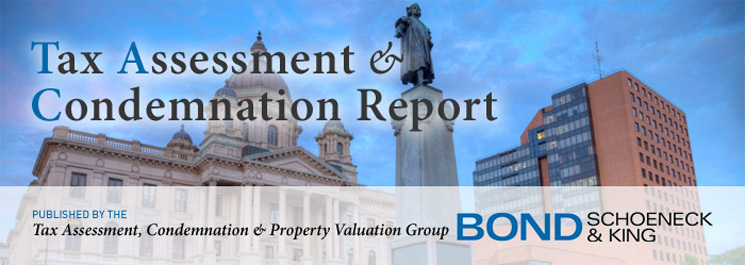
Hello again, readers – here is a new case we thought might be of some interest to you!
In Town of Amherst v Brewster Mews Hous. Co., Inc and Town of Amherst v. Pepper Tree Hgts. Hous. Co., Inc. (4th Dept. 2015), the Appellate Division held that a taxing jurisdiction could not use contract remedies to recover taxes not levied on real property due to an “improperly-granted” PILOT exemption.
Specifically, in 2014 the Town of Amherst (in Erie County) sued Brewster Mews and Pepper Tree Heights (two local senior apartment complexes) claiming that they owed over $2 million in property taxes. The Town’s claim centered on the apparent fact that the Respondents ceased qualifying for the exemption granted to them under Private Housing Finance Law § 33. Under this section of law, the Respondents’ complexes were tax exempt but were required to make PILOT (payment in lieu of tax) payments. However, in the mid-1990s, the Respondents amended a key document known as the “Declarations of Interest and Equity Agreements” making each property ineligible for the PHFL § 33 property tax exemption. The Respondents advised the Town of this change in status in 1996, but the Town took no further action to revoke the exemption afforded to the Respondents’ properties.
That status change notwithstanding, the Respondents continued to make their scheduled, agreed-upon PILOT payments and the Town continued to accept such payments. In 2013, finally, the Town realized that something was amiss. To that end, the Town commenced proceedings to recover taxes forgiven by virtue of the PILOT for years 1996 to 2013. The Town’s claims against the Respondents were based upon unjust enrichment and breach of implied contract causes of action, among others.
The Appellate Division dismissed the Town’s causes of action for unjust enrichment, holding that a Petitioner “may not assert an unjust enrichment cause of action as a substitute for assessing and levying taxes in accordance with the RPTL.” The Appellate Division also held that the Town is not entitled to an implied contract cause of action for the unlevied taxes because taxes are “forced contributions” to shoulder governmental expenses and, as such, do not spring forth from any contractual relationship between a governmental entity and its constituent taxpayers.
Happy holidays!